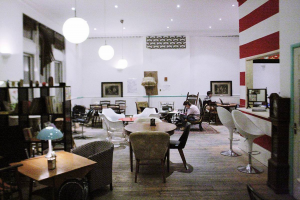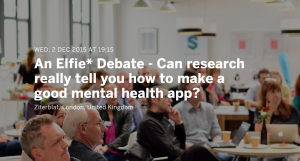
National Elf Service press release: for immediate release
Three of the leading lights in digital mental health (NIHR MindTech, mHabitat and The Mental Elf) are hosting a debate that will bring together mental health service users, researchers, practitioners and developers to discuss the role of clinical research in the development of mental health apps.
The expert debate will take place in London, and on Twitter, at 7.30pm on 2nd Dec 2015, on the eve of the #Mindtech15 Annual Symposium, which this year is concerned with Harnessing the Digital Revolution.

We’re taking over the Ziferblat Venue on Old Street in London for our Elfie Debate.
This house believes that clinical research is essential to develop a good mental health app
It is now widely accepted that high quality research is essential to develop safe and effective healthcare interventions. In mental health, it is not just medicines that are subjected to such rigorous study, but also talking treatments and all kinds of other psychosocial interventions. Indeed, NICE requires well-conducted randomised controlled trials (RCTs) before it will recommend a treatment in its guidance.
However, mental health apps tend to follow a very different development route. On the whole they are built using an agile process, which may involve coproduction with service users and usability testing to ensure they meet user needs. It is still unusual for randomised studies to be conducted on digital health products, and there are mixed opinions about whether all digital products, some of which may be low intensity tools for self-management, rather than clinical interventions, need this level of evaluation. Some argue a lighter touch evaluation is all that is required, relative to the nature of the product and perceived risk.
The speakers
Speaking for the motion are:
- Psychiatrist and mental health app developer Russell Green
- Psychiatrist and digital health enthusiast Lia Ali @LJ_Ali1
Speaking against the motion are:
- Notts FT Involvement Volunteer Paul Radin @paul_radin
- Editor of One in Four magazine Mark Brown @MarkOneInFour
Get involved
The debate is now sold out but we are offering a limited number of tickets to journalists and bloggers who wish to cover the event. Please contact jennifer.martin@nottingham.ac.uk, Programme Manager at NIHR MindTech, if you are interested in attending.
The event will be live tweeted and we’ll be broadcasting Periscope videos of the talks on Twitter. Please follow @NIHR_Mindtech, @mHabitat, @Mental_Elf and post your comments and questions to #mindtech15
We will also be running a Twitter poll to allow you to vote in the debate even if you can’t make it in person.

Check out the Eventbrite page for the debate.
The organisers
NIHR MindTech Healthcare Technology Cooperative aim to identify unmet clinical needs in mental health and dementia, to collaborate on developing and testing a range of new technologies, and to provide advice and knowledge exchange to help increase their adoption. The MindTech team has a range of clinical and technical expertise and they also have an active Involvement Team and wider network of service users and representatives from patient organisations. http://www.mindtech.org.uk/ Thanks to Lucy and Jen from Mindtech for turning this idea into a reality.
mHabitat discover, develop and deploy digital tools and services. They are funded by and part of the NHS. All of their income is reinvested in developing a sustainable approach to digital innovation for public services. Their team is made up of clinical and social care expertise, digital technology and project management, event management, academic expertise and administration: http://wearemhabitat.com/ Thanks to Victoria from mHabitat for coming up with the idea of a debate and chairing on the evening (watch out speakers – she has a klaxon!)
The Mental Elf helps health and social care professionals keep up to date with the latest reliable mental health research. Over 100 experts write blogs for the website, which has over 30,000 followers on Twitter. The Mental Elf is part of the National Elf Service, which covers a range of health and social care topics and allows subscribers to connect with experts, track their learning and contribute to their CPD: https://www.nationalelfservice.net/ André will be handing out prizes to all our speakers and making more and more terrible elf puns as the evening rolls on.

@vsmacdonald #mindtech15 debate London Dec 2: Is clinical research essential to develop good mental health apps? https://t.co/39c2a65Fih
RT @Mental_Elf: @drphilhammond #mindtech15 debate London Dec 2: Is clinical research essential to develop good mental health apps? https://…
@patrickjbutler #mindtech15 debate London Dec 2: Is clinical research essential to develop good mental health apps? https://t.co/39c2a65Fih
@JeffYoung #mindtech15 debate London Dec 2: Is clinical research essential to develop good mental health apps? https://t.co/39c2a65Fih
RT @Mental_Elf: @claudiahammond #mindtech15 debate London Dec 2: Is clinical research essential to develop good mental health apps? https:/…
@juliaoftoronto #mindtech15 debate London Dec 2: Is clinical research essential to develop good mental health apps? https://t.co/39c2a65Fih
@senseaboutsci #mindtech15 debate London Dec 2: Is clinical research essential to develop good mental health apps? https://t.co/39c2a65Fih
@janedreaper #mindtech15 debate London Dec 2: Is clinical research essential to develop good mental health apps? https://t.co/39c2a65Fih
@whippletom #mindtech15 debate London Dec 2: Is clinical research essential to develop good mental health apps? https://t.co/39c2a65Fih
@DannyBuckland #mindtech15 debate London Dec 2: Is clinical research essential to develop good mental health apps? https://t.co/39c2a65Fih
@trished #mindtech15 debate London Dec 2: Is clinical research essential to develop good mental health apps? https://t.co/39c2a65Fih
@sarahboseley #mindtech15 debate London Dec 2: Is clinical research essential to develop good mental health apps? https://t.co/39c2a65Fih
@PA #mindtech15 debate London Dec 2: Is clinical research essential to develop good mental health apps? https://t.co/39c2a65Fih
@mjrobbins #mindtech15 debate London Dec 2: Is clinical research essential to develop good mental health apps? https://t.co/39c2a65Fih
@bengoldacre #mindtech15 debate London Dec 2: Is clinical research essential to develop good mental health apps? https://t.co/39c2a65Fih
Don’t miss: Is clinical research essential to develop good mental health apps? https://t.co/WRORDIz90i #mindtech15 debate 7.30pm Dec 2
Is clinical research essential to develop good mental health apps? https://t.co/oWGr2TA9Zu via @NatElfService
Great opportunity to have a say: Is clinical research essential to develop good mental health apps? https://t.co/AO8C4QshA0 @Mental_Elf
.RT @roz_davies: Is research essential to develop good mental health apps? https://t.co/p5QM9IsyyI
Is clinical research essential to develop good mental health apps? https://t.co/HshTUvnvGy via @NatElfService